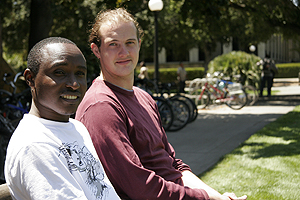July 29, 2009 - By Ruthann Richter

As part of the Global Health Corps, Isaac Mutabazi and Ian Mountjoy will be working together to distribute medical equipment and drugs to remote areas in Rwanda.
STANFORD, Calif. — Isaac Mutabazi was born and raised in a refugee camp in Uganda and did not see his native country of Rwanda until he was 16 years old, returning for the first time with millions of his countrymen following the 1994 genocide. Now, he is working in Rwanda to help rebuild the country’s health-care system as a fellow in a new program, the Global Health Corps. The program aims to promote global health equity both in the United States and abroad and build a new movement of global health leaders.
“For me, it is amazing because I see it as a continuation of the rebuilding of my country,” Mutabazi, 30, said of the fellowship. “There is a lot to do. The fellows will go a long way to make significant changes.”
The program is designed to help meet an ever-growing demand among new college graduates who are hungry for opportunities in global health.
“When I graduated from college, I wasn’t able to find a program for the kind of thing I was interested in,” said Barbara Bush, president of the Global Health Corps and daughter of former President George W. Bush. “I had to find a way to do a program on my own, working in a hospital in South Africa. It was by chance.”
Bush is among a core group of twenty-something organizers of the Global Health Corps, which grew out of a conference last year focusing on future leadership in HIV/AIDS. Bush’s twin sister, Jenna Bush, attended that meeting, along with Jonny Dorsey, a 2009 Stanford graduate and founder of FACE AIDS, a national student campaign to fight AIDS in Africa.
They joined forces and obtained seed money for the new venture from Google.org, raising some $500,000 to date from private organizations. The program is a partnership with FACE AIDS and includes among its sponsors Stanford’s Office of Global Health and the Stanford Center for Health Policy.
The first 22 fellows, all college graduates age 35 or less, were selected earlier this year from a group of 1,300 applicants. The goal is to grow the program each year, increasing to spots for 125 fellows within three years, said Barbara Bush.
The current class arrived in July at Stanford for an intensive, two-week orientation and will head out to their assignments in early August.
The fellows are to work in teams of two — one American and one African. The pairing is intended to help promote cross-cultural awareness and understanding about global health inequities.
“I suspect this will be a sentinel experience for you,” Michele Barry, MD, Stanford’s new senior associate dean for global health, told the group on the first orientation day. “This will be a unique bonding. It will give you such cultural awareness, and I think it will make a difference in how you view yourself in the world you live in.”
The fellows’ assignments will take them to Rwanda, Tanzania, Malawi, New York or New Jersey. They will work at sites in these locations in one of five nonprofit organizations: the Clinton HIV/AIDS Initiative, Partners in Health, the Southern African Center for Infectious Disease Surveillance, the Newark-based Covenant House International and the University of Medicine and Dentistry in Newark, N.J.
They’ll be involved in a variety of tasks. For instance, two fellows will work with the Clinton HIV/AIDS Initiative in Malawi, helping improve nutrition and maternal/child health. At the University of Medicine and Dentistry of New Jersey, the pair of fellows will develop educational and outreach programs for an under-served, inner-city population and help improve health literacy, which has been shown to be a barrier to obtaining health care.
Mutabazi and his matched fellow, UC Berkeley graduate Ian Mountjoy, will work with the Boston-based Partners in Health and the Rwandan government in helping to ensure that needed equipment and medications, such as antiretroviral drugs for treating HIV/AIDS, are made available to hospitals, clinics and pharmacies in remote areas of Rwanda.
“I will be part of the local population, seeing how they face each day and working with this remarkable group of Partners in Health,” said Mutabazi, who graduated from the Kigali Institute of Science and Technology and has done graduate work at the University of Dundee in Scotland.
A civil engineer by training, he said he found the orientation particularly helpful in that it offered him an introduction to health issues, as well as practical advice on how to conduct fieldwork. The orientation featured multiple Stanford faculty and outside presenters on issues such as social justice, democracy and development in Africa, microfinance, urban poverty and homelessness in America and the ethics and dilemmas of public service work. The fellows also developed closer relationships through informal activities such as a scavenger hunt in San Francisco and a bowling night in Palo Alto.
The fellows will continue to get support from the Global Health Corps after they complete their one-year assignments, as the hope is that they will make global health a life-long career.
“We want them to think broader and bigger and consider themselves as ambassadors for global health beyond the year,” said Dave Ryan, founding director of the program.
About Stanford Medicine
Stanford Medicine is an integrated academic health system comprising the Stanford School of Medicine and adult and pediatric health care delivery systems. Together, they harness the full potential of biomedicine through collaborative research, education and clinical care for patients. For more information, please visit med.stanford.edu.